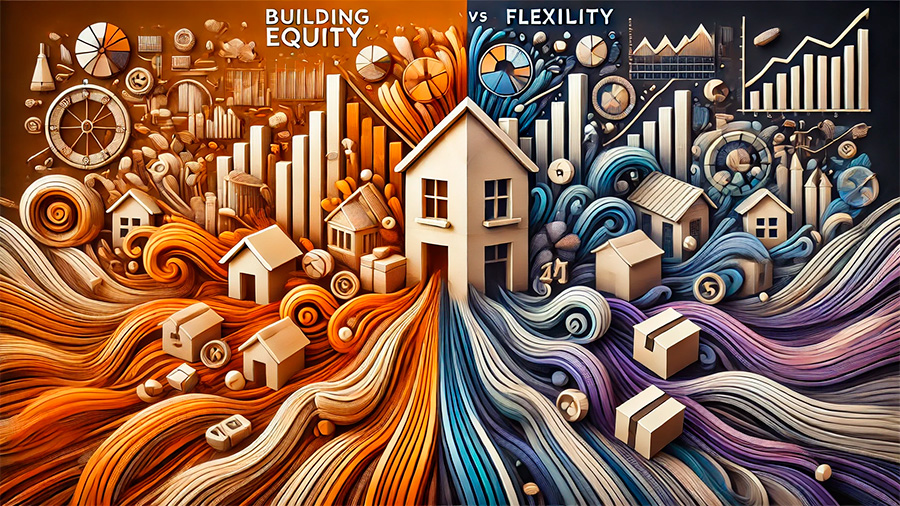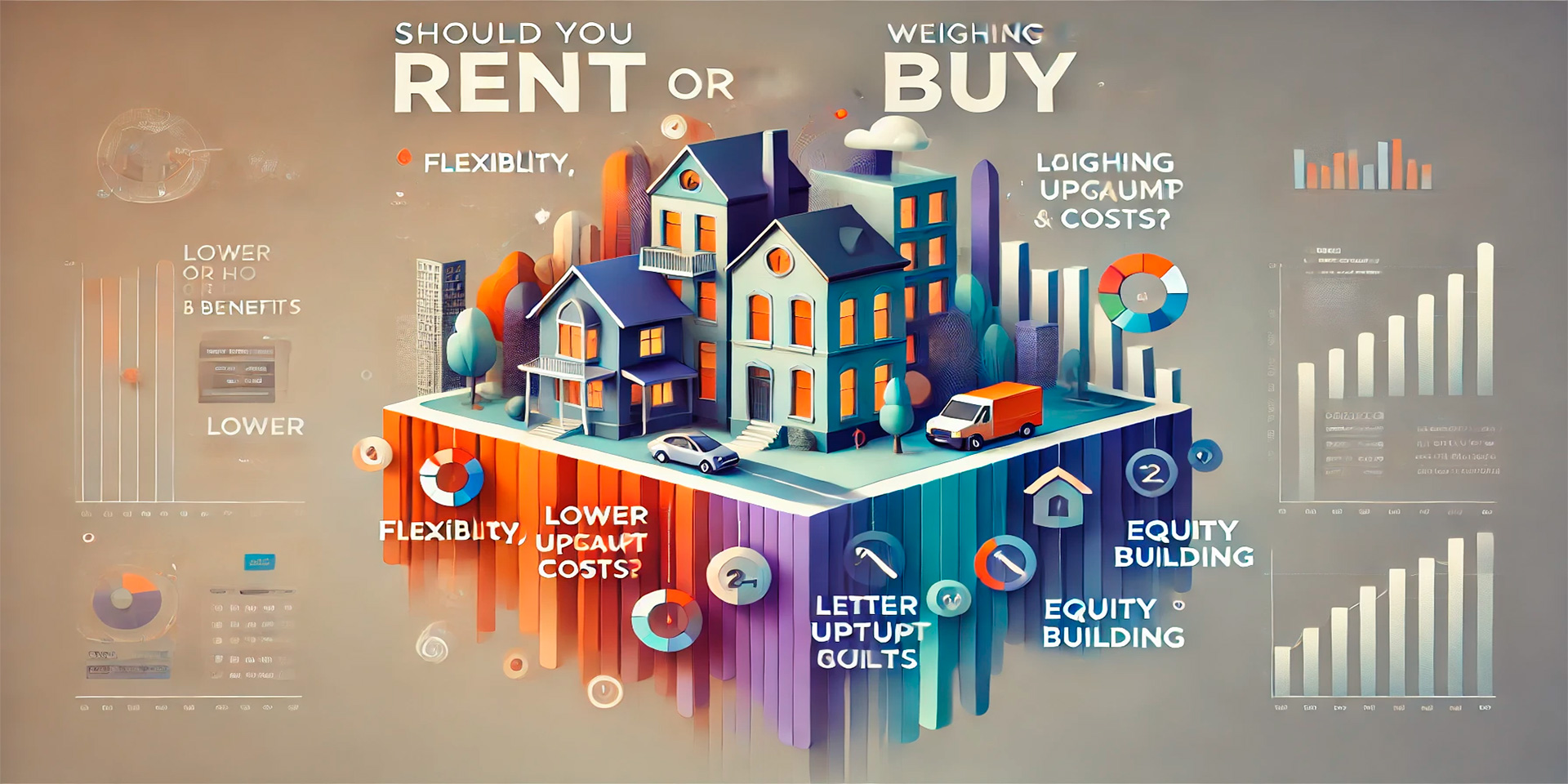With rising housing costs, many individuals are faced with a crucial decision—whether to rent or buy a home. In 2024, this decision is more complicated than ever, as fluctuating interest rates, housing affordability, and market conditions have shifted the dynamics of both renting and buying. Understanding the pros and cons of each option can help you determine which path is best for your financial situation and long-term goals. In this article, we’ll explore the key factors to consider when deciding between renting and buying in today’s market.
The Financial Impact of Renting vs. Buying
The financial implications of renting versus buying are often the most significant factors in making a decision. Both options come with different costs, and understanding these differences is essential for evaluating which is more financially viable.
Cost of Renting
Renting offers flexibility without the long-term commitment of owning a property. The primary costs associated with renting include monthly rent, utilities, and renter’s insurance. In competitive rental markets, rent prices can be high, but renting often requires less upfront investment compared to buying a home.
Renters typically face fewer financial obligations than homeowners. For example, tenants are not responsible for property maintenance, repairs, or property taxes, which can make renting more affordable in the short term. Additionally, renters can easily relocate when their lease ends, offering greater flexibility for those whose life circumstances may change.
However, renting does not build equity. The money paid in rent goes directly to the landlord, without contributing to your long-term financial future. This is a key disadvantage for those who are looking to build wealth through homeownership.
Cost of Buying
Buying a home involves a significant upfront investment, including a down payment, closing costs, and ongoing expenses such as mortgage payments, property taxes, insurance, and maintenance. While these costs can be daunting, homeownership offers the potential for long-term financial benefits.
One of the primary advantages of buying is that homeowners build equity over time as they pay off their mortgage. Equity is the portion of the home’s value that you own outright, and it can grow as the property appreciates in value. For many, homeownership is seen as an investment that can lead to wealth accumulation, especially in markets where property values increase over time.
However, the financial burden of homeownership also includes long-term maintenance and repairs, which can add up over the years. Additionally, fluctuations in the housing market can affect the value of the property, potentially leading to financial losses if the market declines.

Flexibility and Commitment
When deciding whether to rent or buy, it’s important to consider your lifestyle and how much flexibility you need. Renting and buying offer different levels of commitment, and understanding these differences can help you choose the option that best suits your personal and professional circumstances.
Flexibility in Renting
One of the main advantages of renting is the flexibility it offers. Most rental agreements last between six months and one year, giving tenants the option to move relatively quickly if their circumstances change. This is ideal for individuals who may need to relocate for work, prefer the convenience of not being tied to one place, or are not ready to commit to a long-term home purchase.
Renting is also a good option for those who may be uncertain about their future plans, such as younger professionals or those considering a move to a new city. Since renting requires less financial commitment and flexibility in location, it can be an attractive choice for those who value mobility and short-term living arrangements.
Long-Term Stability in Buying
Buying a home provides long-term stability and roots you in a community. Homeownership is typically seen as a long-term investment, with most homeowners staying in their homes for at least five to seven years. For families or individuals looking to settle down in one location and invest in a stable future, buying can offer the security of owning a property.
Additionally, owning a home provides the freedom to make modifications and renovations, allowing homeowners to personalize their living space without needing permission from a landlord. This level of control over your environment can be a significant advantage for those who want to create a long-term home for themselves or their families.
However, buying also comes with the responsibility of maintaining the property, which can be both time-consuming and expensive. Homeowners are responsible for all repairs, updates, and ongoing maintenance, which requires both a financial and emotional commitment to the property.
Market Conditions in 2024
The state of the housing market in 2024 is another critical factor in the rent versus buy debate. Interest rates, home prices, and rental rates all play a role in determining which option is more favorable at a given time.
Interest Rates and Mortgage Affordability
In 2024, interest rates are a major consideration for potential homebuyers. Mortgage rates fluctuate based on the Fed’s monetary policy, and even small changes in rates can significantly impact the affordability of buying a home. When rates are low, buyers can lock in affordable monthly payments, making homeownership more attractive. However, when rates rise, the cost of borrowing increases, and homeownership becomes more expensive.
For buyers in 2024, it’s essential to keep an eye on mortgage rates and understand how they impact monthly payments. If rates are expected to rise further, locking in a lower rate sooner rather than later can save thousands over the life of the loan. However, if rates are currently high, it may be more prudent to wait for better conditions before making a purchase.
Rental Market Trends
The rental market in 2024 is experiencing its own pressures. In many urban areas, rents have been rising steadily due to high demand and limited supply. Renters may find it increasingly difficult to find affordable housing, particularly in major cities where rental costs have outpaced wage growth.
However, renting still offers an advantage in markets where home prices have risen faster than rental rates. For individuals who cannot afford the high upfront costs of buying a home, renting remains a more accessible option, especially in areas where purchasing a home would require a significant financial sacrifice.
It’s also worth considering that in some markets, renting may be the only viable option due to a shortage of available homes for sale or prohibitive housing prices. In such cases, renting allows individuals to live in desirable locations without taking on the full financial burden of homeownership.

Building Equity vs. Flexibility
At the heart of the renting versus buying decision is the trade-off between building equity and maintaining flexibility. Homeownership allows individuals to build equity and invest in a long-term asset, while renting provides the freedom to move and adjust to life changes without the burden of property ownership.
Building Wealth Through Homeownership
For many, the primary appeal of buying a home is the opportunity to build wealth through equity. As homeowners pay off their mortgage, they gradually increase their ownership stake in the property. Over time, if the property appreciates in value, homeowners can realize a significant return on investment when they sell the home.
Additionally, owning a home can provide stability in terms of monthly payments. With a fixed-rate mortgage, homeowners can predict their housing costs for the life of the loan, unlike renters who may face annual rent increases. This predictability makes homeownership an attractive option for those looking to secure long-term financial stability.
Flexibility in Renting
On the other hand, renting offers flexibility that homeownership cannot. Renters can move more easily, avoid the costs of home maintenance, and adjust to life changes without the financial commitment of owning a property. For those who prioritize flexibility and do not want to be tied to a specific location, renting provides the freedom to relocate without the complexities of selling a home.
Renting also shields tenants from market fluctuations, such as declining home values or increased property taxes. While renters may face rent increases, they are not exposed to the financial risks associated with owning a home, such as unexpected repair costs or the potential for the home to lose value over time.
Conclusion: Which Is the Best Option in 2024?
Deciding whether to rent or buy in 2024 depends on your financial situation, lifestyle, and long-term goals. Renting offers flexibility and lower upfront costs, making it an attractive option for those who prioritize mobility or are not ready to commit to homeownership. However, buying provides the opportunity to build equity and invest in a long-term asset, making it the right choice for individuals who are financially prepared and seeking stability.
Ultimately, the decision between renting and buying comes down to personal preferences and market conditions. By carefully weighing the pros and cons of each option, you can make an informed decision that aligns with your financial and lifestyle needs in today’s ever-changing housing market.
